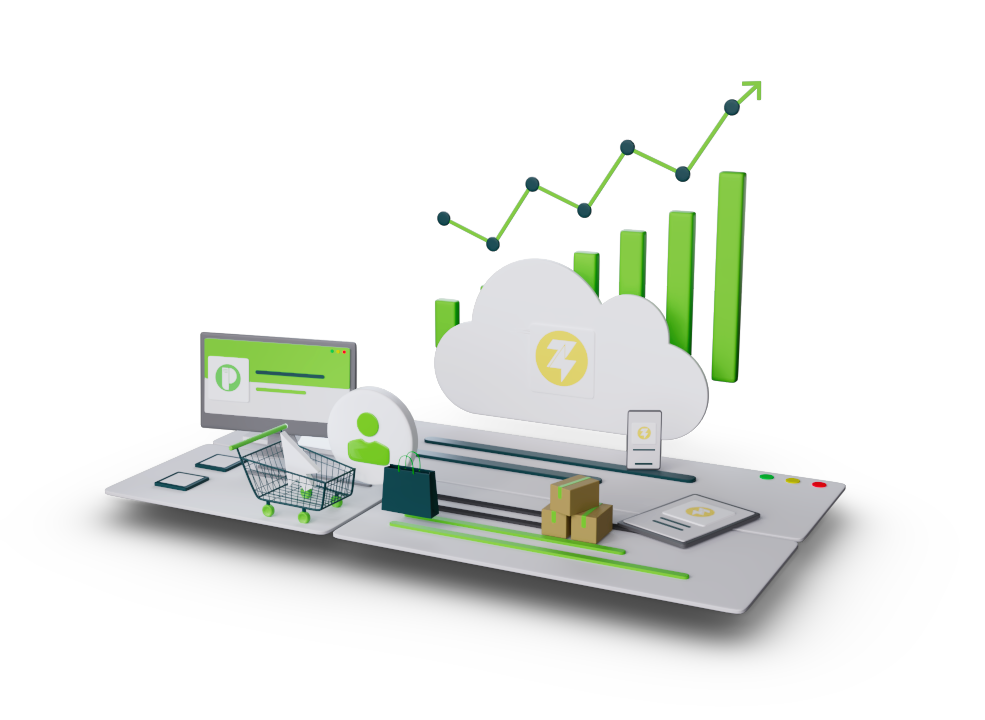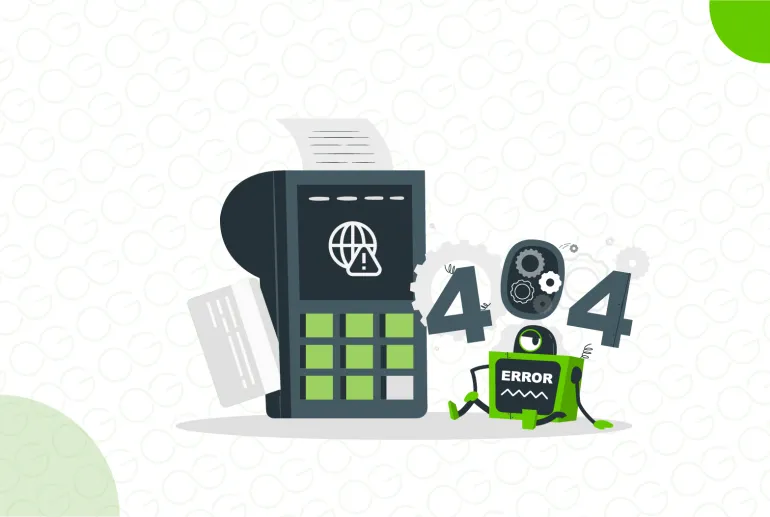Mistakes you should avoid when choosing a POS system
A Point of Sale (POS) system is crucial for any retail business, serving as the central hub for managing sales, inventory, and customer data. It streamlines operations, improves efficiency, and enhances the customer experience. However, choosing the right POS system requires careful thought, as mistakes during the selection process can lead to costly issues down the road. Whether you're starting a new business or upgrading an existing system, it’s essential to make an informed decision.
When selecting a POS system, many retailers make avoidable mistakes that can hinder their business performance. In this blog, we’ll explore some of the common mistakes retailers should avoid when selecting a POS system, along with tips to ensure you make the right choice.

Transform Your Retail Experience with Ginesys POS.
1. Buying Hardware Before Software
One of the most common mistakes retailers make is purchasing POS hardware before selecting the software. This can create compatibility issues, which may lead to inefficiencies or even require additional costs to fix. Retailers often assume that hardware is a one-size-fits-all solution, but this is far from the truth. POS systems vary in their hardware requirements, and not all software will work seamlessly with all types of hardware.
For example, some POS software may require specific types of barcode scanners, printers, or cash drawers. If you’ve already bought hardware, you may find that the POS software you choose is incompatible with your existing equipment, leading to delays and additional costs.
How to Avoid This Mistake:
- Assess Your Needs First: Before making any purchases, assess your business's specific needs, including the volume of transactions, inventory size, and the types of payments you accept.
- Choose Software First: Always select your POS software before purchasing hardware. This ensures compatibility and saves you from making additional purchases later.
- Consult with Vendors: Some vendors offer bundles that include both hardware and software, ensuring that all components are compatible and cost-effective.
2. Opting for Cheaper Products Without Checking Features
When it comes to POS systems, the price is often the first factor that business owners consider. While sticking to a budget is important, opting for the cheapest POS system may lead to bigger issues down the road. Cheaper products may lack essential features, compromise on security, or have poor customer support.
It's easy to be tempted by a low-cost POS system, especially if it appears to offer basic functions such as billing and inventory tracking. However, without the necessary features to support your business’s needs, you may find yourself upgrading to a more expensive system later.
How to Avoid This Mistake:
- Prioritise Features Over Cost: Start by identifying the essential features your business requires. This could include inventory management, multi-location support, CRM integration, and real-time reporting.
- Look for Scalability: Ensure the POS system you choose can grow with your business. Investing in a system with limited functionality may seem cost-effective now, but it can be a costly mistake if you need to switch systems as your business expands.
- Evaluate Total Cost of Ownership: Consider the long-term costs, including software upgrades, support fees, and hardware replacements. A cheap system may have hidden costs that increase the total investment over time.

3. Not Evaluating the Hardware Vendor
Purchasing POS hardware from unknown or unreliable vendors can lead to poor product quality, lack of support, and limited warranty options. Retailers often make the mistake of purchasing hardware online without researching the vendor's background. Without knowing who you're buying from, you may end up with subpar hardware that fails during peak business hours or doesn’t come with adequate customer support.
Hardware failure can result in lost sales, unhappy customers, and costly repairs or replacements. Moreover, buying from unreliable sources can lead to poor after-sales service, especially if you need repairs or support during non-business hours.
How to Avoid This Mistake:
- Research Vendor Experience: Ensure the hardware vendor has a proven track record in the retail industry. Experienced vendors are more likely to understand your business needs and provide appropriate solutions.
- Evaluate Warranty and Support: Look for vendors who offer comprehensive warranties and responsive after-sales support, especially during weekends or peak business hours.
- In-Person or Online Reviews: Look for customer reviews, testimonials, and case studies to understand the vendor’s reputation and customer service.
4. Not Evaluating the Software Vendor
While retailers may focus on the POS software’s features, they often neglect to evaluate the software vendor itself. This can be a costly mistake, as the vendor’s experience, support structure, and training options are just as important as the product’s features. A vendor who lacks experience in the retail industry may not understand the specific challenges retailers face, leaving you with inadequate support or poorly designed features.
The vendor’s support structure is also crucial. If your POS system encounters issues, you’ll want to ensure that you can get help quickly, especially during critical times like holidays or sales events. Poor customer service or limited support hours can lead to downtime, lost revenue, and frustrated customers.
How to Avoid This Mistake:
- Vendor Experience Matters: Choose a software vendor with experience in the retail industry. Experienced vendors will understand the unique challenges of retail operations and can provide solutions tailored to your business needs.
- Check Support Availability: Ensure the vendor offers customer support beyond standard business hours. Retail businesses often operate outside of traditional 9-to-5 schedules, so 24/7 support is ideal.
- Training and Onboarding: Evaluate the training options provided by the vendor. Whether it’s one-on-one training sessions or detailed user manuals, make sure you have access to resources that will help you and your staff learn the system.

Avoid Costly Mistakes – Choose the Right POS System with Our Expert Tips!
5. Not Evaluating Enough POS Software Programs
Choosing the first POS system you evaluate, or selecting the cheapest one, can lead to regret later. Different POS systems come with a range of features, functionalities, and hidden costs. If you don’t take the time to evaluate multiple options, you may miss out on a system that better fits your business needs or end up paying more for features you don’t require.
Many POS systems may offer basic functionalities such as billing and inventory tracking, but they may lack advanced features such as loyalty programs, real-time reporting, or customer relationship management (CRM). Additionally, some POS systems may have hidden costs for software updates, cloud storage, or transaction fees that you didn’t account for initially.
How to Avoid This Mistake:
- Compare Multiple Systems: Evaluate at least three to five POS systems before making a decision. Compare their features, costs, and customer reviews.
- Trial Periods: Take advantage of free trials or demos offered by POS providers. This will allow you to test the system and see how it performs in real-world scenarios.
- Check for Hidden Costs: Ask vendors about potential hidden costs such as maintenance fees, upgrade charges, or transaction fees. Make sure you’re aware of the total cost of ownership before making a decision.
Choosing the right POS system requires careful consideration, and Ginesys offers a reliable, feature-rich solution that meets the needs of modern retail businesses. Ginesys retail POS software is designed to provide seamless billing, continuous data synchronisation, and support for digital wallet transactions, ensuring a smooth and efficient retail experience.
Features of Ginesys POS Software:
- Fast and User-Friendly Billing: Ginesys offers a fast and efficient billing system, allowing businesses to process transactions quickly, even during peak hours.
- Graphics and Text Mode Bill Printing: Choose between graphic or text mode printing, depending on your business’s needs.
- Seamless Data Synchronisation: The system ensures continuous data synchronisation without slowing down operations, keeping your data up to date at all times.
- Digital Wallet Support: Ginesys POS supports authenticated digital wallet transactions, offering customers more convenient payment options.
Additional Mistakes to Avoid When Choosing a POS System
a) Ignoring Scalability and Future Needs
When selecting a POS system, it's easy to focus only on current needs and ignore potential future growth. A system that works for a small business today may not be able to handle increased transaction volumes, multiple locations, or additional features as your business expands.
To avoid this, ensure the POS system you choose is scalable and capable of growing with your business. Whether you plan to expand to multiple locations, integrate with e-commerce platforms, or add more features, your POS system should have the flexibility to support these changes without requiring a complete overhaul.
b) Not Considering Integration with Other Systems
A modern retail business often uses multiple software solutions, including inventory management, accounting, CRM, and e-commerce platforms. If your POS system cannot integrate seamlessly with these tools, it can create data silos, leading to inefficiencies and manual data entry.
Choose a POS system that integrates with your existing software and allows for easy data sharing across platforms. This will help streamline operations and provide a more holistic view of your business.
c) Neglecting Mobile POS Solutions
As more customers prefer contactless and mobile payments, businesses need to adapt by offering mobile POS solutions. A mobile POS system allows your staff to process transactions from anywhere in the store, improving customer service and reducing wait times.

Discover the essential features you need in a POS system for retail success.
Make the Right Choice for Your Retail Business
Choosing the right POS system is a critical decision that can significantly impact your retail business's efficiency, customer satisfaction, and overall profitability. By avoiding common mistakes such as buying hardware before software, opting for cheaper products without considering features, and failing to evaluate vendors, you can ensure a smoother selection process.
Ginesys provides a robust and reliable POS solution that meets the needs of modern retailers. With features like fast billing, seamless data synchronisation, and support for digital wallet transactions, Ginesys offers everything you need to manage your retail operations efficiently.
By taking the time to evaluate your business needs, researching vendors, and comparing different systems, you’ll be well on your way to choosing the right POS system for your business.

